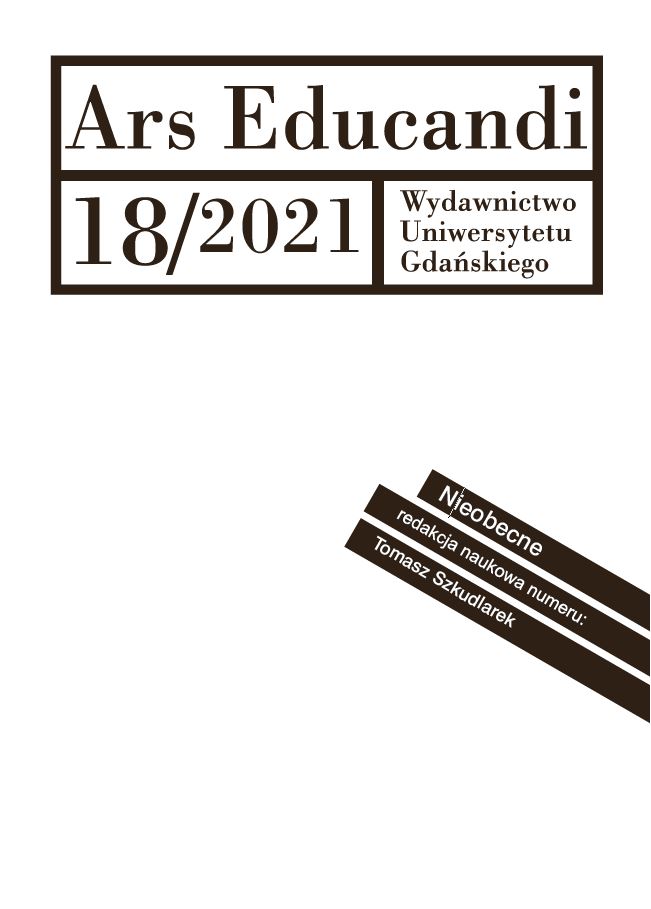Towards social engineering
DOI:
https://doi.org/10.26881/ae.2021.18.07Keywords:
inżynieria społeczna, unifikacja, maszyny społeczne, matematyzacja, eksperyment myślowyAbstract
The article proposes a departure from cultivating general knowledge in pedagogy toward social engineering. It considers proposals for the transformation of pedagogical knowledge in order to make it communicative beyond the area of the humanities. The goal of these transformations is to optimize and simplify the knowledge to a level that allows its adepts a DIY approach. The proposed solution consists in: 1) deriving scientific justifications from what is pedagogically impossible; 2) mathematization of the language of description; 3) creating sets of procedures requiring minimal knowledge and limiting the actions
of adults to a minimum.
Downloads
References
Ariely, D. (2016). Payoff: The hidden logic that shapes our motivations. Simon and Schuster.
Bendell, J. (2016). Deep Adaptation: a map for navigating climate tragedy. IFLAS Occasional Paper, 2, 36. www.iflas.info
Biswas, T., & Mattheis, N. (2021). Strikingly educational: A childist perspective on children’s civil disobedience for climate justice. Educational Philosophy and Theory, 0(0), 1–14. https://doi.org/10.1080/00131857.2021.1880390
Bravington, A., & King, N. (2019). Putting graphic elicitation into practice: tools and typologies for the use of participant-led diagrams in qualitative research interviews. Qualitative Research, 19(5), 506 –523. https://doi.org/10.1177/1468794118781718
Case, N. (2018). How to Become a Centaur. Journal of Design and Science, 3. Dostępny na: https://jods.mitpress.mit.edu/pub/issue3-case.
Deutsch, D., & Marletto, C. (2015). Constructor theory of information. Proceedings of the Royal Society A: Mathematical, Physical and Engineering Sciences, 471(2174). https://doi.org/10.1098/rspa.2014.0540
Dudzikowa, M., & Knasiecka-Falbierska, K. (2013). Sprawcy i/lub ofiary działań pozornych w edukacji szkolnej. Oficyna Wydawnicza Impuls.
Engdahl, I. (2012). Doing friendship during the second year of life in a Swedish preschool. European Early Childhood Education Research Journal, 20(1), 83–98. https://doi.org/10.1080/1350293X.2012.650013
Evans, M. D. R., Kelley, J., & Sikora, J. (2014). Scholarly culture and academic performance in 42 nations. Social Forces, 92(4), 1573–1605. https://doi.org/10.1093/sf/sou030
Fisher, R. (2006). Still thinking: The case for meditation with children. Thinking skills and creativity, 1(2), 146-151.
Główny Urząd Statystyczny [GUS]. (2010). Szkoły wyższe i ich finanse w 2009 r. Warszawa: Główny Urząd Statystyczny.
Główny Urząd Statystyczny [GUS]. (2020). Szkolnictwo wyższe i jego finanse w 2019 r. Warszawa: Główny Urząd Statystyczny.
Ito, T. (2004). Instructions for use 自然保護の新しい展望 田中俊徳. 乳幼児発達臨床センター年報, 26, 45–55.
Jaedtke, A. (2019). Metoda Self-Reg Stuarta Shankera w życiu codziennym rodziców. Gdańsk: Uniwersytet Gdański.
Jankowiak-Maik, A. (2020). Największy kryzys w oświacie w Polsce od kuchni–relacja. Czas Kultury, 36(01), 81-89.
Knasiecka-Falbierska, K. (2014). Student – klient na współczesnym uniwersytecie. Pedagogika Szkoły Wyższej, 15, 93–104.
Kolb, D. A. (2015). Experiential learning: Experience as the source of learning and development. Pearson Education Inc.
Kwaśnica, T. (1990). Ku pytaniom o psychopedagogiczne kształcenie nauczycieli, [w:] Z. Kwieciński, L. Witkowski (red.), Ku pedagogii pogranicza. Toruń: Wydawnictwo Naukowe Uniwersytetu Mikołaja Kopernika.
Kwieciński, Z. (1991). Tekstualizacja nieobecności. Wprowadzenie. [w:] Z. Kwieciński (red.), Nieobecne dyskursy cz.1. Toruń: UMK.
Michniuk, A. (2020). Why Polish Teachers Quit Jobs in Public Schools? Research Report. Yearbook of Pedagogy, 43(1), 153–165.
Mitra, S., & Dangwal, R. (2010). Limits to self-organising systems of learning - The Kalikuppam experiment. British Journal of Educational Technology, 41(5), 672–688.
Ostrowicka, H. (2015). Przemyśleć z Michelem Foucaultem edukacyjne dyskursy o młodzieży. Dyspozytyw i urządzenie. Kraków: Impuls.
Roland, E., & Midthassel, U. V. (2012). The Zero program. New Directions for Youth Development, 133, 29–39. https://doi.org/10.1002/yd
Shanker, S., Barker, T. (2016). Self-reg. Jak pomóc dziecku i sobie nie dać się stresowi i żyć pełnią możliwości?, N. Fedan (tłum.). Warszawa: Mamania.
Yamada, S., Kanda, T., & Tomita, K. (2020). An escalating model of children’s robot abuse. ACM/IEEE International Conference on Human-Robot Interaction, 191–199. https://doi.org/10.1145/3319502.3374833
Zamojski, P. (2019). Pedagogika skupiona na rzeczy – wprowadzenie do idei. Parezja. Czasopismo Forum Młodych Pedagogów Przy Komitecie Nauk Pedagogicznych PAN, 11(1), 12–29.
Ziółkowska, K. (2019). Uczniowie wobec motywowania ich przez nauczyciela. Uniwersytet Gdański.

 Academic Scientific Journals
Academic Scientific Journals




